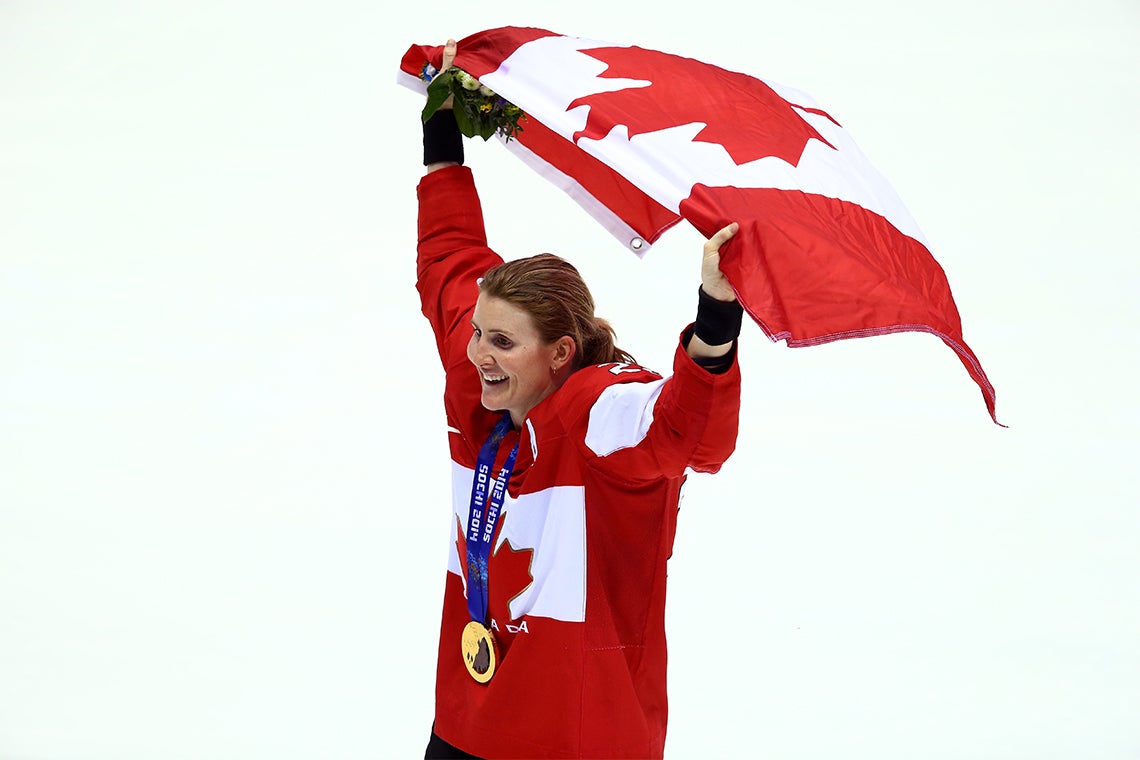Hayley Wickenheiser on why she pursued a career in emergency medicine
After a legendary hockey career that included induction into the Hockey Hall of Fame, Hayley Wickenheiser is now pursuing another childhood dream: to become a doctor.
Her interest in the medical field dates back to her youth when one of her friends was seriously injured after being hit by a truck.
“There were 30 kids in our neighborhood and we went as a pack to check on her,” says Wickenheiser, a four-time Olympic gold medalist who is in her second year in the Department of Family and Community Medicine (DFCM) at Temerty Faculty of Medicine at the University of Toronto.
“I remember that the doctors and nurses were very kind. We were small and they made it less scary for us. That’s when I really started to get interested in medicine.”
Wickenheiser was called up to the Canada women’s national ice hockey team at age 15, but although she focused on the sport in her young adulthood, she was drawn to medicine.
“I always knew I needed a life after hockey and thought it would be a good one,” says Wickenheiser, who is training to be an emergency medicine doctor.
Wickenheiser will begin her Advanced Skill Year in Emergency Medicine in the Department of Family and Community Medicine in July 2023.
Wickenheiser says she chose to pursue her residency in the department because she would learn about a wide range of topics and complete a generalist education that allows for maximum flexibility in her career.
While fewer medical graduates rank family medicine as their first choice when applying for residency training, Wickenheiser is very happy with her decision.
“Family medicine is touted as less ‘sexy’ than residency, but I think it’s the best kept secret in medicine and one of the most underappreciated avenues you can take,” she says. “I have no regrets choosing DFCM – it was amazing. From great professional development to teacher training, sometimes it really is an adventure that you can choose for yourself. I like it.”

Gold medalist Hayley Wickenheiser celebrates at the Sochi 2014 Winter Olympics (Photo by Doug Pensinger/Getty Images)
After Wickenheiser announced her retirement from hockey in 2017, she began studying medicine at the University of Calgary. The transition was made easier by years of preparation. Prior to her retirement, Wickenheiser accompanied an emergency physician for nearly a decade, which helped her see her affinity for the field. “I’m not good at sitting all day,” she says.
She is quick to sum up what drew her to emergency medicine: “Every patient encounter is different. You have to think fast, work in a team and be very good under pressure. It feels very much like a team sport.”
Widely regarded as one of the greatest hockey players of all time, Wickenheiser figured she would be done with the sport when she began college. “Then the Toronto Maple Leafs called a few months out of med school,” she says.
As assistant general manager of the Leafs, Wickenheiser oversees 11 employees and is responsible not only for franchise player development, but also prospects and players for the Toronto Marlies and affiliated Newfoundland Growlers.
“My job is to make sure it’s a well-functioning department where we help players on and off the ice to maximize their potential and prepare them to be successful NHL players — if they already are.” If you’re a successful NHL player, help them find that 1 percent here and there that can improve their game,” she says.
Her work day varies depending on her clinical responsibilities, but generally her duties with the Leafs means she wakes up early and goes to the rink for practice. If she is doing a family medicine rotation, she will work in an afternoon or evening clinic. When she works a hospital shift that runs from 8am until late afternoon, she says she adjusts her schedule accordingly.
Wickenheiser says the parallels between sport and medicine are striking.
“I apply everything I learned in hockey every day,” she says. “Medicine is a team game. You have to think fast. You have to deal with stress. You have to be at your best physically.”
She also says that constructive criticism to improve performance is another common theme.
“In medicine you are constantly being told what needs to be improved. Being able to use it productively is very important for your development as a doctor.”
There is, she adds, a big difference between those two worlds when it comes to self-care and wellness. “As an athlete, you’re celebrated for taking care of your body. In medicine, it sometimes feels like this should be the last thing you should do as a doctor who cares about everyone else. I think it’s counterintuitive. In my opinion, medicine needs to get much better in this regard.”
When asked what motivates her to stay on a difficult path, Wickenheiser, who grew up on a farm in rural Saskatchewan, says hard work is part of her identity.
“I don’t consider myself overly smart or special in any way, but one thing I tip my hat to as an athlete and in medicine is that I’m confident that I can outwork just about anyone. It’s the only thing I know I can control in my life, even when other things happen that I can’t. You can always control your effort.”